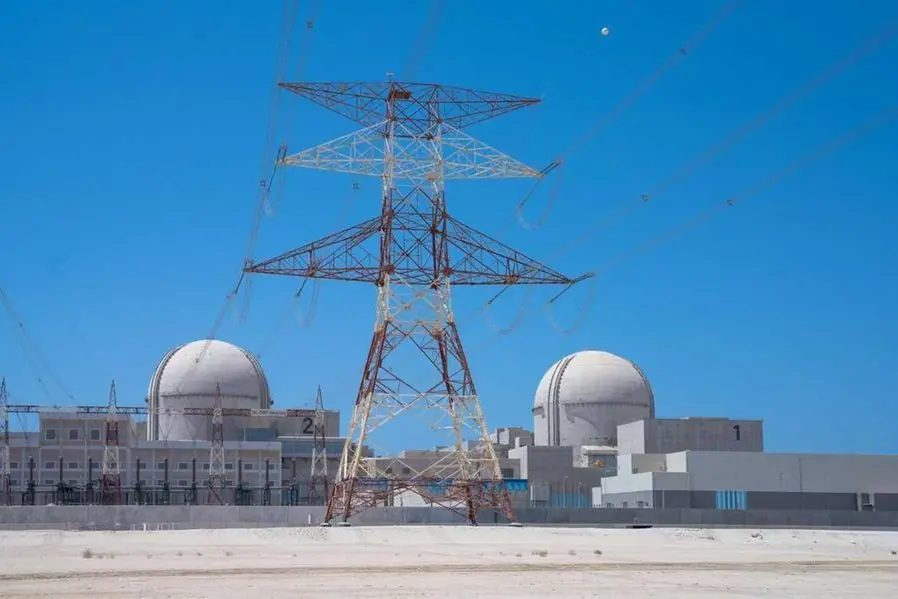PHOTO
UAE - Emirates Nuclear Energy Corporation (Enec) has announced that its operating and maintenance subsidiary, Nawah Energy Company, has begun the process of loading fuel assemblies into the reactor of the Barakah plant following the granting of operating licence by Federal Authority for Nuclear Regulation (FANR) to Nawah for Unit 3 of the plant.
The Barakah plant, located in the Al Dhafra region of Abu Dhabi, is one of the largest nuclear energy plants in the world, with four APR-1400 Units.
Enec pointed out that with Unit 3 now approved to operate alongside Units 1 and 2, this milestone demonstrates the substantial and swift progress that has been made in developing nuclear energy as a strategically significant, clean and abundant source of electricity for the UAE, while transforming the country’s energy landscape and enhancing national energy security.
According to Enec, Unit 4 is in the final stages of commissioning prior to construction completion.
Managing Director and CEO Mohamed Ibrahim Al Hammadi said: "We are delighted to receive the Operating License for Unit 3 at the Barakah Plant, and we look forward to the start of reliable electricity production alongside Units 1 and 2 in the coming months."
"As we count with Unit 3, we are rapidly delivering a practical climate solution on the ground, enabling the UAE’s large-scale decarbonisation efforts alongside its economic growth, and leading the way to achieving Net Zero emissions by 2050," stated Al Hammadi.
"The success and benefits of bringing each Unit at Barakah into operation in consecutive years since Unit 1 in 2020 showcase the significant benefits of developing a multi-unit nuclear energy plant in driving energy security and sustainability for nations that commit to the long-term development process of a civil nuclear programme," he added.
Enec pointed out that the receipt of the Unit 3 operating license confirms that the plant, people, programmes, policies and procedures meet FANR’s robust standards, after conducting 120 unit-specific reviews and inspections.
In addition, all voluntary reviews by the International Atomic Energy Agency (IAEA) and the World Association of Nuclear Operators (WANO) have been successfully completed. Prior to the license from FANR, WANO completed a Pre Start-Up Review (PSUR), confirming the Unit’s readiness for operation, it stated.
This is the third unit that will enter the operational phase in the last three years, leveraging the expertise and experience of the operating teams, and the knowledge gained during the loading of fuel into Unit 1 in February 2020 and Unit 2 in March 2021.
With the completion of the fuel load process, the operations team will proceed with preparations for start-up of the Unit later this year, followed by the delivery of the first megawatts of clean and reliable electricity.
Nawah CEO Engineer Ali Al Hammadi said: "Receiving the third operating licence for Barakah plant is the result of over 520 rigorous reviews to date from our independent regulator, FANR, of which 120 are related specifically to Unit 3. The reviews cover every aspect of the plant to ensure we are ready to operate in line with national regulatory requirements."
"Successfully passing these reviews is testament to the expertise we have developed and the outstanding operating experience of our teams, made up of highly-skilled and qualified UAE Nationals and international experts. As they make progress in bringing another unit into the operations phase, we are proud of our highly qualified professionals for their dedication and achieving the milestones in accordance with the highest standards of performance and operational excellence," noted Al Hammadi.
"When it begins to operate at full power within the coming months, the third Unit will add a further 1,400 MW zero-carbon emission electricity to the national grid, similar to each of the other two reactor Units, propelling the country ahead in meeting its goal of achieving Net Zero emissions by 2050," he added.
The Barakah Plant is the only multi-unit nuclear energy plant operating in the Arab world. A powerhouse for the nation’s sustainable development and stability, the Plant generates high-value jobs and stimulates the growth of local industries.
Barakah also provides significant environmental benefits for the nation today and for the next 60 years and beyond, through rapid decarbonization of the energy sector. When fully operational, the plant will prevent 22.4 million tons of carbon emissions - the leading cause of climate change - every year..
Copyright 2022 Al Hilal Publishing and Marketing Group Provided by SyndiGate Media Inc. (Syndigate.info).





















